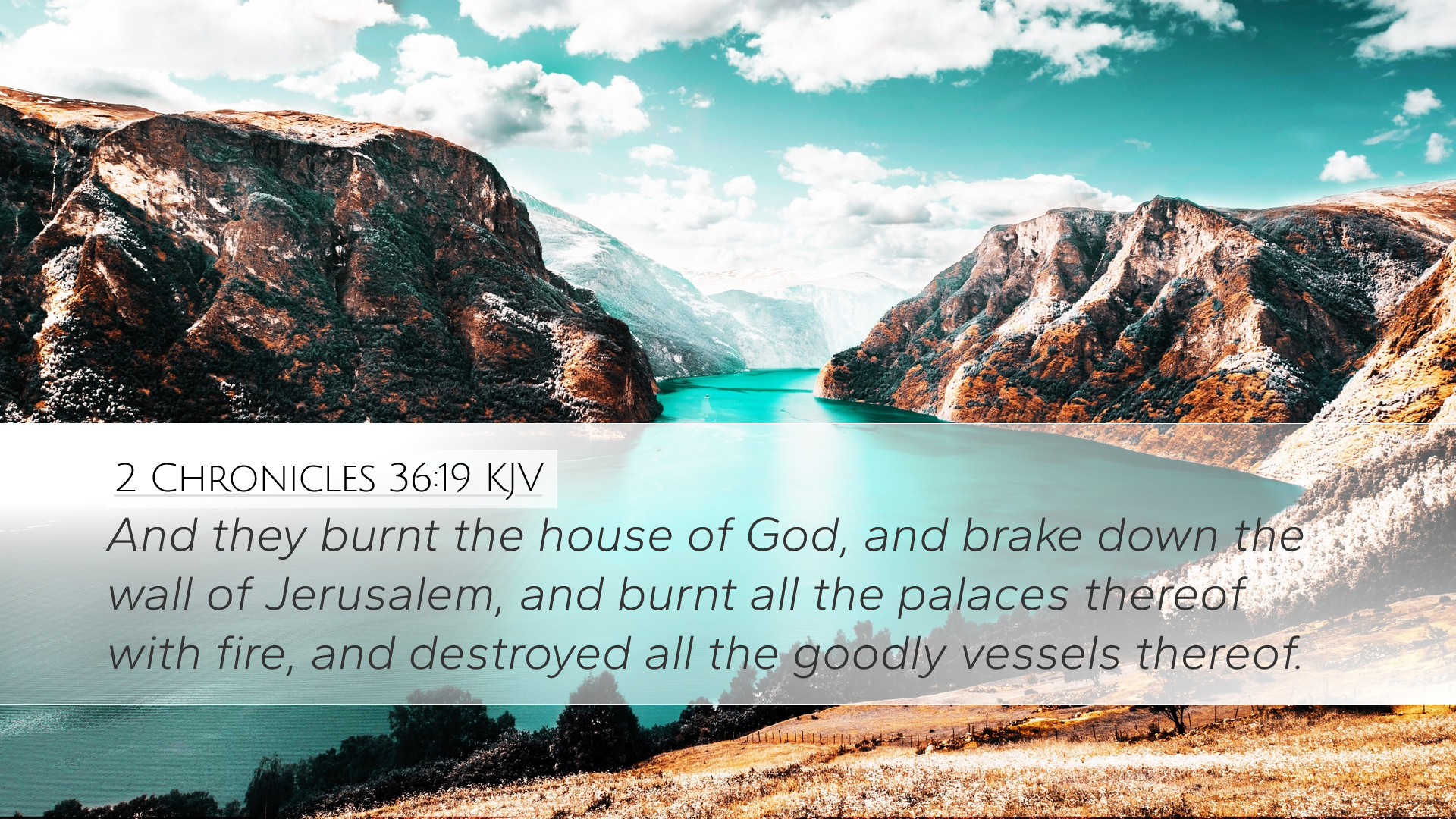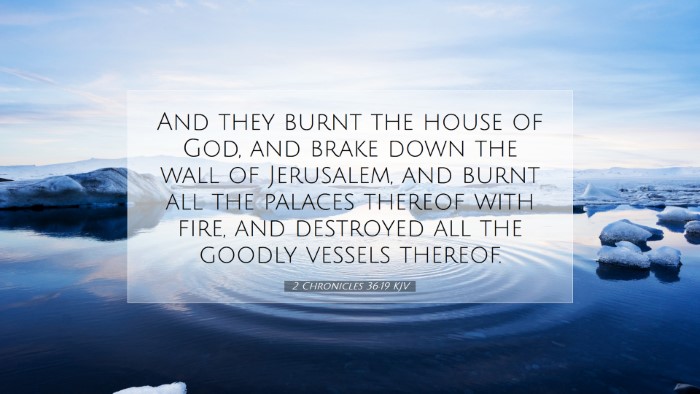Commentary on 2 Chronicles 36:19
Bible Verse: “And they burnt the house of God, and brake down the wall of Jerusalem, and burnt all the palaces thereof with fire, and destroyed all the goodly vessels thereof.” (2 Chronicles 36:19)
Introduction
The verse captures a pivotal moment in the history of Israel, marked by devastation in Jerusalem and the destruction of Solomon's Temple. This commentary unpacks the theological implications, historical context, and moral lessons gleaned from this sobering account.
Historical Context
The final chapter of 2 Chronicles recounts the downfall of Judah, foregrounding God's judgment following persistent rebellion against Him. The context surrounding this verse directly correlates to the preceding chapters highlighting King Zedekiah's disobedience, the people's idolatry, and their failure to heed God's prophets.
Matthew Henry's Insight
Matthew Henry notes that the destruction was not only physical but spiritual, symbolizing the severe consequences of turning away from the covenant with God. He emphasizes that God had long sought repentance among His people, and the ultimate judgment was a result of persistent denial of His call.
Albert Barnes’ Commentary
Albert Barnes elaborates that the destruction of the temple represents the culmination of a long history of neglect toward divine commandments. The physical tearing down of walls and burning of palaces served as an emblem of spiritual depravity, showcasing how far Israel had drifted from its foundations of faith and respect for God's commandments.
Adam Clarke's Observations
Adam Clarke highlights the emotional weight of this event. The mourning expressed by the prophets and the people over the loss of their temple indicates a deep spiritual crisis. Clarke draws attention to the fact that God's house was treated with contempt during the siege, reflecting the broader erosion of respect for sacredness in the community.
Theological Significance
This verse serves as a reminder of the seriousness of sin and the type of judgment that follows unrepentant hearts. From a theological perspective, it reveals God's justice and holiness while simultaneously reflecting His desire for restoration.
The Justice of God
The severity of God’s response to sin is emphasized through the destruction of His own house. As noted by various commentators, the temple was not just a physical structure but a representation of God's presence and covenant with His people. The eradication of this sacred space underscores the gravity of failing to uphold God's glory and commandments.
Restoration and Hope
Despite the grave reality of the situation, Scripture points toward eventual restoration. Matthew Henry suggests that God's ultimate purpose is not only to bring judgment but also to pave the way for redemption. This cyclical pattern of judgment followed by grace is a consistent theme throughout the Biblical narrative, demonstrating God's enduring mercy.
Lessons for Today
The historical accounts in 2 Chronicles carry application for contemporary believers, highlighting the need for vigilance in faithfulness to God. They beckon the modern church to reflect on both the dangers of secularism and the importance of holding fast to spiritual truths.
Importance of Repentance
This passage encourages believers to embrace an attitude of repentance. The destruction of the temple signifies a call to evaluate personal and communal fidelity to God. Reflecting on the insights from Clarke, pastors and theologians are prompted to advocate for genuine repentance and a return to spiritual disciplines rooted in Scripture.
Discernment in Leadership
The failures of King Zedekiah serve as a potent reminder of the impact of leadership within the church and society. As Barnes notes, leaders must be vigilant stewards of both their lives and their roles within the community of believers. This underscores a profound understanding of accountability, particularly regarding maintaining a faithful witness.
Conclusion
In 2 Chronicles 36:19, we confront the stark consequences of forsaking the divine covenant, illustrated vividly through the destruction of the temple and the city of Jerusalem. Through the combined insights of Matthew Henry, Albert Barnes, and Adam Clarke, we are reminded that while God's judgment is thorough and necessary, His mercy is at the heart of His actions, leading to hope and restoration. As we reflect deeply upon these truths, let us inspire ourselves and our communities to remain steadfast in faith, always seeking to honor God in all aspects of our lives.


